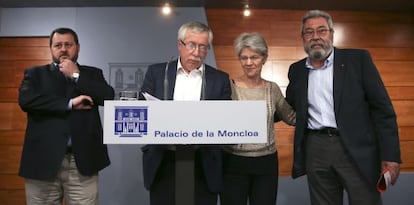EU will give Spain two billion euros to boost jobs for young people, says minister
Unions skeptical of progress at European Summit Social issues “will not be given room,” argues CCOO head

Employment Minister Fátima Báñez announced on Monday that Spain would be receiving 1.5 to 2 billion euros of EU funds to help combat youth unemployment. The total amount that the EU is planning on spending on the problem, assuming that the plan is approved by the European Council this week, is expected to reach six billion euros.
Báñez made the announcement after meeting on Monday with the prime minister, Mariano Rajoy, and the leaders of Spain’s main labor unions in the Moncloa palace. According to government sources, Spain is likely to receive between 800 and 900 million euros a year from the program. To secure these funds, and to try to get the plan underway by 2014, Báñez said Spain was planning to “fight the good fight” at this week’s European Summit.
Unemployment in Spain currently stands at around 27 percent of the active population. Meanwhile, even more worryingly, 57 percent of Spanish youngsters are without work, a fact that has led to an exodus of young professionals who feel they have little real chance of finding a job at home.
After Monday’s meeting, the principal union representatives said they were skeptical ahead of the European Summit, which will be held in Brussels on June 27 and 28, because they believe that priority issues for workers and citizens within the EU will not be addressed.
After a 90-minute meeting, the leader of the CCOO union, Ignacio Fernández Toxo, who is also the president of the European Trade Union Confederation (ETUC), warned that social issues “were not going to be given any room” at the upcoming meeting, despite the fact that their inclusion was one of the commitments agreed upon at the last European Summit, held in December of last year.
“More worried”
As such, the CCOO leader said he left Monday’s meeting “more worried” than he had been previously, given that he is skeptical about the possibility of more funds being released to fight unemployment.
For his part, the general secretary of the UGT labor union, Cándido Méndez, struck a slightly more positive note, saying the Spanish government has “been able to switch from a position whereby it is being swept along, to a position of resistance,” given that “it understands that a lack of decisions is creating additional problems.”
The unions are also calling for the establishment of a “social salary” in Europe, in line with the minimum wage, as well as dialogue on social issues at an EU-wide level. This initiative, according to ETUC general secretary Bernadette Ségol, who was also present at Monday’s meeting, should not be just a “simple exchange of viewpoints,” but rather a genuine chance to change policies implemented so far by the different countries.
Tu suscripción se está usando en otro dispositivo
¿Quieres añadir otro usuario a tu suscripción?
Si continúas leyendo en este dispositivo, no se podrá leer en el otro.
FlechaTu suscripción se está usando en otro dispositivo y solo puedes acceder a EL PAÍS desde un dispositivo a la vez.
Si quieres compartir tu cuenta, cambia tu suscripción a la modalidad Premium, así podrás añadir otro usuario. Cada uno accederá con su propia cuenta de email, lo que os permitirá personalizar vuestra experiencia en EL PAÍS.
¿Tienes una suscripción de empresa? Accede aquí para contratar más cuentas.
En el caso de no saber quién está usando tu cuenta, te recomendamos cambiar tu contraseña aquí.
Si decides continuar compartiendo tu cuenta, este mensaje se mostrará en tu dispositivo y en el de la otra persona que está usando tu cuenta de forma indefinida, afectando a tu experiencia de lectura. Puedes consultar aquí los términos y condiciones de la suscripción digital.








































